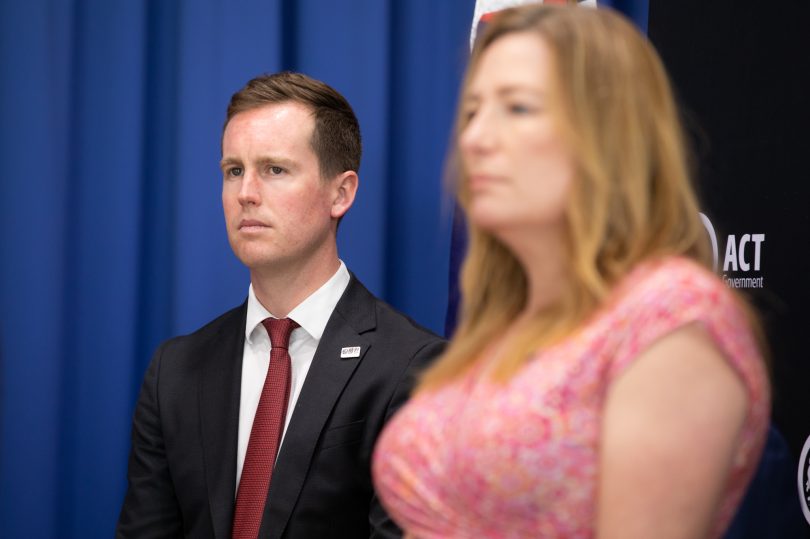
Minister for Skills Chris Steel and Minister for Education Yvette Berry have both been criticised by the Opposition over procurement decisions. Photo: Michelle Kroll.
An ACT Legislative Assembly inquiry has recommended the government strengthen its procurement processes, including by adding value for money assessments into every decision made.
It follows the ACT Government repeatedly coming under fire from the Opposition over its alleged “culture of secrecy” shrouding its procurement decisions.
Last week, Minister for Skills Chris Steel was criticised by the Canberra Liberals for knowing about what they called “dodgy” and “unusual”, incomprehensible multi-million dollar contracts but allowing them to go ahead under his watch anyway.
The most recent and expensive of these contracts will now be independently reviewed after CIT’s board said it could not assure the government the almost $5 million contract represented value for money.
Earlier this year, the government’s Campbell Primary School modernisation tender was blasted by the Territory’s Auditor-General as having not been dealt with fairly or impartially. ACT Integrity Commissioner Michael Adams said procurement issues raised in that report were likely to be “endemic” in the Territory’s public sector.

Opposition leader Elizabeth Lee has called on the ACT Government to review its procurement decisions. Photo: Region Media.
Opposition Leader Elizabeth Lee has called on the government to commit to reviewing every single procurement decision it has undertaken in the last five years.
A Legislative Assembly Committee chaired by Elizabeth Kikkert has now accepted all of the recommendations made by the Territory’s Auditor-General Michael Harris in an earlier report.
It also made nine recommendations of its own, including that every procurement must include value-for-money assessments and signed conflict of interest declarations.
None of the 33 procurements considered by the Auditor-General had included the latter.
The Audit Office found that none of the audits got “everything right the whole way through”.
In many cases, value for money may have been “considered” as part of the procurement process, Special Minister of State Chris Steel had told a committee hearing, but there was no evidence it had been documented.
The Auditor-General also found that many procurement decisions did not assess ‘whole-of-life costs’ when evaluating value for money, which the government has now been urged to consider.
The committee recommended the government improve and strengthen procurement documentation processes and establish assurance schemes across all directorates.
It said procurements should be accurately reported and that the government implement a system of management action for breaches of the procurement framework. Not only should the non-compliance be recorded and monitored, but any management action should also be reported.
After finding that some contracts had not been published on the ACT’s contract register, the committee recommended that the government ensure the register is kept up to date as a public reporting tool.
The committee also said the Procurement ACT should provide greater direct support to ACT Government entities that infrequently procure.
The ACT Government has four months to respond to the Committee’s report.




















